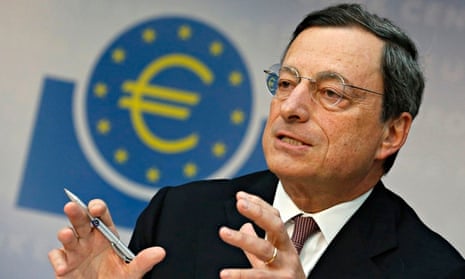Prices are tumbling, right across the eurozone. But for consumers from Amsterdam to Athens, this is not a bumper Christmas sell-off: the falling cost of their weekly shop reflects a deep economic malaise.
After Brussels statisticians announced last week that inflation had been negative in December, with prices falling at an annual rate of 0.2%, experts warned that without drastic action the eurozone may be sliding towards a Japanese-style deflationary slump.
“This move in December is significant,” said Janet Henry, European economist at HSBC, “because it’s the first time that inflation has been negative since 2009 – in the depths of the crisis – and it’s going to turn further negative in the next few months.”
News that the long-predicted onset of deflation had arrived – aided by the recent sharp drop in oil prices – will intensify the pressure on Mario Draghi, president of the European Central Bank (ECB), to press on with quantitative easing – one of the few tactics available to central bankers hoping to reflate the economy when interest rates are already on the floor. But some experts have little confidence that even a large-scale intervention will do much good.
“I think they’ve left it a bit too late to do anything about this,” says Russell Jones, of Llewellyn Consulting. “What took them so long? This has been building, and getting more and more embedded in people’s expectations.”
Economists don’t generally worry too much about short periods of deflation, particularly if they are caused by external factors –such as the plunging oil price. Cheaper energy boosts demand by putting more money in the pockets of consumers in oil-importing countries.
But there have long been concerns that in the eurozone, where growth is weak and a number of countries remain in recession, falling prices could become widespread and entrenched – and that’s what really worries euro-watchers. Some countries, including bailed-out Greece and Portugal, have been living with falling prices – and wages – for some time. With exchange rates between member countries of the single currency fixed, this process of “internal devaluation” was seen by many as a painful but necessary way for struggling countries to restore their competitiveness against more productive rivals such as Germany.
Yet even in Germany, which narrowly avoided recession in 2014, inflation is running at just 0.2%. The ECB’s official mandate is to keep inflation across the eurozone “close to 2%”.
Consumers who believe that prices are going to continue falling tend to sit on their hands, postponing spending in the belief that their money will go further in the future. This weak demand can cause businesses to cut back on investment and stint on wages and a vicious spiral sets in. This is particularly dangerous for heavily indebted countries, as deflation increases the real value of their debts.
In Japan, policymakers have spent more than two decades trying to jolt the economy out of just this kind of deflationary trap: the country’s debt-to-GDP ratio has rocketed to well over 200%.
HSBC’s Henry warns that some in the eurozone are already responding to the uncertain climate and the prospect of declining prices. “For companies in particular, there’s already evidence of deflationary behaviour. Why are they going to invest if they think things are going to be even cheaper tomorrow?”
Peter Praet, the ECB’s chief economist, said in an interview last month: “What we are increasingly worried about … is the high risk that after seven years of crisis and poor economic performance in the euro area, businesses and households are reducing their long-term growth expectations and adapting to weak growth and low inflation. To some extent this risk is already materialising: companies are starting to adjust to a 1% growth/1% inflation economy.”
Behavioural changes like these are notoriously hard to forecast: the impact on workers’ pay of their employers’ chastened mood will depend partly on the specifics of wage-bargaining, for example. But if the onset of deflation adds to the downbeat mood, it may take a long time to shift.
As Praet put it: “Before the crisis we probably had excessively high growth expectations. Now it is the opposite. The big risk is that this growth pessimism perpetuates the current situation.”
Danny Gabay of Fathom Consulting, warns that in some ways, the situation in the eurozone is worse than Japan’s at the start of what used to be known as its “lost decade” – before the 10-year stretch became 20 years and more.
“Japan didn’t fall into deflation with debts of 100% of GDP, unemployment in double digits and recession,” he said. “It started from a pretty good point compared with Europe.” Average unemployment across the eurozone is 11.5%, more than twice Japan’s historical maximum.
The ECB’s governing council will meet in Frankfurt on 22 January to decide whether to press ahead with quantitative easing. It has already been purchasing corporate bonds but full-blown QE – as undertaken in the US, UK and Japan in recent years – involves buying large volumes of sovereign bonds.
However, unlike in those countries, it is unclear whether the ECB has the powers to embark on this controversial policy. On Wednesday, the European court of justice (ECJ) is due to issue a preliminary opinion on whether large-scale buying of crisis-hit countries’ bonds, known as Outright Monetary Transactions (OMT), is allowed under European law.
In relatively calm times, when the trigger on OMT looks unlikely to be pulled, that sounds like an academic legal niggle. Yet if the court delivers an adverse opinion, Draghi’s hands could be tied. OMT is a firefighting measure, devised to fulfil his promise in July 2012, when many investors were betting on a euro breakup, to do “whatever it takes,” to safeguard the single currency.
If the ECJ echoes the reservations of Germany’s constitutional court about direct buying of member countries’ bonds, the argument would apply equally to purchases of sovereign bonds under any large-scale QE programme.
The German court suggested that bond-buying was beyond the ECB’s mandate – it impinges on economic policy, which is the remit of governments, and could amount to a back-door bailout – and asked the ECJ to examine the issue. Any sign that the court echoes these concerns would strengthen the hand of sceptics, including Germany’s Bundesbank boss Jens Weidmann, who has repeatedly argued against QE and claimed last month that there was “a whole row of economic reasons” against the policy.
Some analysts say the ECB could sidestep the constitutional difficulties, and placate QE’s critics, by leaving individual central banks responsible for any eventual losses on the bonds the ECB buys; but that might dampen the impact of the policy, by encouraging investors to target more vulnerable member states if the risk of default appears to be rising. Much of the evidence on the effects of QE suggests it is most effective if central banks do it on a large scale.
And while QE could buy the eurozone time, driving down long-term interest rates and giving exporters a boost by weakening the currency, it wouldn’t solve the longer-term challenges of restoring growth and helping the banking sector work off the legacy of the credit crunch. “I don’t think QE’s a panacea,” says Jones at Llewellyn Consulting.
Some experts now believe the eurozone will not be able to avoid a long period of lacklustre growth and high unemployment, which in turn is likely to fuel demands for an alternative to the doctrine of austerity. A recent report from Lombard Street Research said: “The main threat to the euro now comes from stubbornly high unemployment and the resulting appeal of populist politics. In fact, in a relatively short period of time new parties in Italy (the Five Star Movement and a transformed Lega Nord), Spain (Podemos), Greece (Syriza) and Germany (Alternative für Deutschland) have emerged to challenge the mainstream incumbents.”
Greece’s a general election is set for 25 January, just a few days after the ECB’s meeting. The radical Syriza party, which wants to write off some of the country’s hefty debt burden and repudiate many of the onerous conditions of its bailout, is expected to win the popular vote. Its charismatic leader, Alexis Tsipras, is promising not just to extricate Greece from the clutches of its creditors, but to set the entire eurozone on a new path. He described his party in a recent article for the Huffington Post as “the alarm clock which will lift Europe from its lethargy and sleepwalking”.
But it may take more than that to really jolt Europe’s firms and consumers out of their deflationary funk.








Comments (…)
Sign in or create your Guardian account to join the discussion